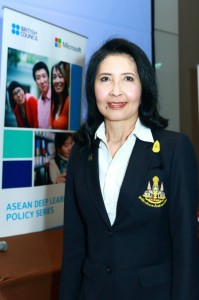New ways of teaching help equip students with job and life-skills of the future

BANGKOK, March 09, 2015 Technology has transformed everything from economy to the way we live at an incredible rate. Also, technology has created new jobs and changed the skillsets employers require from the workforce. To equip Thai students with skills of future jobs, change in learning practices is needed, concluded experts at the ‘Building Skills for the Future – Real Word Problem Solving Skills’ panel discussion which was held recently in Bangkok, part of the ASEAN Deep Learning Policy seminar jointly held by British Council and Microsoft. The policy seminar aimed to promote deep learning skills and prepare students across Southeast Asia to meet the challenges of the 21st century.
Focusing on real-world problem solving skills, the panelists comprised Dr. Kusalin Musikul, Director of the Primary Science Division of the Institute for the Promotion of Teaching Science and Technology (IPST), Dr. Mark Windale, Principal Lecturer in Science and Education at the Centre for Science Education, Sheffield Hallam University, and Ms. Felicia Brown, Asia Pacific Education Programs Director for Microsoft. The session was moderated by Associate Professor Naraporn Chan-o-cha, Vice Chairman of the Distance Learning Foundation.
Need for New Skills
 With technology and innovation booming, the global economy is changing and businesses are evolving. The job market and the skills required from the workforce have followed suit. “Technology has changed everything. It has created new jobs which require new skills. If you look at the top-ten jobs in the market, several of those professions didn’t even exist a decade ago; think of ‘internet merchandiser’, for instance. These new jobs have skills in information and communication technology (ICT) as their fundamental skill-set.” said Dr. Kusalin whose role at IPST is to research and develop science curriculum standards and learning materials for primary school students.
With technology and innovation booming, the global economy is changing and businesses are evolving. The job market and the skills required from the workforce have followed suit. “Technology has changed everything. It has created new jobs which require new skills. If you look at the top-ten jobs in the market, several of those professions didn’t even exist a decade ago; think of ‘internet merchandiser’, for instance. These new jobs have skills in information and communication technology (ICT) as their fundamental skill-set.” said Dr. Kusalin whose role at IPST is to research and develop science curriculum standards and learning materials for primary school students.
 Identified as one of the key 21st century skills, technology skills are becoming more and more important in every job. However, the proportion of the workforce with IT skills is not growing at the same rate as the demand especially in IT professional fields. “The global workforce needs graduates who are ICT literate. Over 50% of today’s jobs require some technology skills and this percentage is expected rise to 77% over the next decade. As for IT professions, there is a gap between demand and supply already. This gap will become significantly larger in the next 5 to 10 years,” said Ms. Brown, a 22-year veteran of the education field who has been supporting educators, school leaders and policy makers through Microsoft’s Education Programs.
Identified as one of the key 21st century skills, technology skills are becoming more and more important in every job. However, the proportion of the workforce with IT skills is not growing at the same rate as the demand especially in IT professional fields. “The global workforce needs graduates who are ICT literate. Over 50% of today’s jobs require some technology skills and this percentage is expected rise to 77% over the next decade. As for IT professions, there is a gap between demand and supply already. This gap will become significantly larger in the next 5 to 10 years,” said Ms. Brown, a 22-year veteran of the education field who has been supporting educators, school leaders and policy makers through Microsoft’s Education Programs.
A study by IDC lists the top twenty skills needed for high growth, high wage positions which are in demand across multinational companies such as jobs in medical support and nursing; sales and marketing; and computer programming. Among the top skills are oral and written communication, problem solving, and Microsoft Office proficiency. The study also suggested that employers are not looking for candidates with specific skills but those who can blend various skill-sets and deploy the combination as demanded by a particular situation.
“As technology is developing quickly and continuously, students are confronted with unforeseen future professional contexts. There will be new jobs which don’t yet exist today. Educators and teachers alike need to ask ourselves how we can help students develop the flexibility and skills they will need for life and work in the future,” observed Dr. Kusalin.
Change in Teaching Practices is Essential
 Technology not only forces educators and teachers to think about skills that will be required in the future, but also how they can align their teaching curriculum to match their students’ skills, talents, and potential while preparing them to join tomorrow’s workforce. The panelist agreed that when it comes to teaching the future workforce, teachers cannot just teach students knowledge: students must be taught how to apply knowledge to real world contexts. To achieve this, new way of teaching is essential.
Technology not only forces educators and teachers to think about skills that will be required in the future, but also how they can align their teaching curriculum to match their students’ skills, talents, and potential while preparing them to join tomorrow’s workforce. The panelist agreed that when it comes to teaching the future workforce, teachers cannot just teach students knowledge: students must be taught how to apply knowledge to real world contexts. To achieve this, new way of teaching is essential.
“For Thai students to be able to thrive in life and work in the 21st century, we need to develop them to become digitally literate critical thinkers and problem solvers. Students will then be able to apply knowledge they learn to solve problems they face beyond the classroom. Teaching practices need to change and develop to help students develop these skills,” acknowledged Assoc. Prof. Naraporn.
Addressing Foreseeable Challenges
Innovative teaching practices are more than the use of classroom ICT, observed Ms. Brown. Technology use needs to be part of cultural and pedagogical paradigm shifts that include encouraging student-centered learning and practicing learning anytime and anywhere.
Teachers are integrating ICT into the learning process to prepare students with skills for the future. However, ICT integration is not easy. In addition to a lack of computers for students, one of the most significant barriers cited by teachers is insufficient professional development. They find themselves with less time and less support but more students in each class.
Using technology to help students develop 21st Century skills
“For remote and rural areas, Microsoft has Office 365 for Education – the cloud computing-based productivity and communication tool that can enable schools in these areas to gain direct benefits from the cloud. Office 365 for Education makes it easier and faster for students and lecturers to collaborate with each other — both for teaching and learning in everyday classroom scenarios. Office 365 also allows better development of long-distance learning infrastructure,” added Ms. Brown.

At the same time, professional development is critical for teachers to formulate impactful classroom practices and leverage the technology available. “Teachers need professional development and support, but training programs should be active and engage teachers while giving them time to reflect and adapt key learnings while developing action plans. After training, they require resources to help them apply best practices in their classrooms. With technology, we can easily support teachers with online resources and online communities where teachers discuss and share their best teaching practices,” said Dr. Windale, who is currently working on the Inspiring Science curriculum development and teacher training project in partnership with Office of the Basic Education Commission (OBEC).
“Partners in Learning (PiL) is a global Microsoft program that fosters innovative use of technology in education to help students and teachers around the world maximize their potential. To date, the program has provided training to more than 12 million educators and enhanced the learning experience for 200 million students in 119 countries. In Thailand, Partners in Learning has reached out to more than 164,000 teachers and 8 million students across 39,000 schools nationwide,” said Ms. Brown.
“If we want to help students develop IT, analytical thinking, and problem solving skills, we must equip teachers with such skills as well,” concluded Assoc. Prof. Naraporn.”
###
About Microsoft
Founded in 1975, Microsoft (Nasdaq “MSFT”) is the worldwide leader in software, services, devices and solutions that help people and businesses realize their full potential.
About Microsoft Thailand
Established in 1993, Microsoft (Thailand) Limited aims to Make 70 Million Lives Better by enabling Thai people and businesses to realize their full potential through technology that transforms the way people work, play, and communicate. We offer software, services, and devices that deliver new opportunities, greater convenience, and enhanced value to people’s lives. Working with communities and the Thai government, Microsoft and its partners are committed to working closely with organizations and people across Thailand to fully harness the power of technology and innovation.
Note to editors : If you are interested in viewing additional information on Microsoft, please visit the Microsoft (Thailand) website at http://www.microsoft.com/thailand, or keep track of the latest updates through the Microsoft Thailand News Center (http://www.microsoft.com/apac/news/thailand/default.aspx) and Twitter (@MicrosoftTH).
Microsoft is a registered trademark of Microsoft Corp. in the United States and / or other countries. The names of actual companies and products mentioned herein may be the trademarks of their respective owners.
For further information, (press) please contact:
Pornravee Suramool or Pattara Tundulyasaree
Hill+Knowlton Strategies Thailand
Tel: 0-2627-3501 ext. 110, 109 or 081-735-9213, 083-544-5550
E-mail: [email protected], [email protected],
